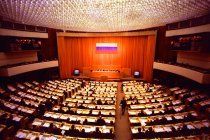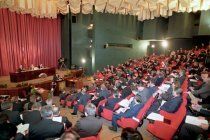 Русский
Русский English
English-







The Federation Council and the State Duma worked for a quarter of century
January 11, 1994, there were first meetings of both chambers of the Russian parliament - the State Duma and the Federation Council. They replaced the previously dissolved by decree of the President of the Russian Federation Boris Yeltsin, the Supreme Council and the Congress of People's Deputies.
The first deputies were elected by vote on December 12, 1993. Elections to the first State Duma were held in a majority proportional system. 444 deputies were elected. Eight parties overcame the five percent barrier: the Agrarian Party of Russia, Russia's Choice, the Democratic Party of Russia, the Women of Russia, the Communist Party of the Russian Federation, the Liberal Democratic Party of Russia, the Party of Russian Unity and Yabloko. Ivan Rybkin was elected as the chairman of the State Duma of the first convocation.
The Parliamentary Newspaper collected quotes from the first speakers of the House and parliamentarians about the work of the State Duma and the Federation Council 25 years ago.
VLADIMIR SHUMEYKO, First Chairman of the Federation Council from January 13, 1994 to January 23, 1996:
“At our meetings, it was sometimes “hotter” than in the Duma. One of the first provisions of the regulations we developed was the prohibition of unification into a faction on political grounds. Both the Communists and the Democrats were sitting in the same room nearby”.
IVAN RYBKIN, Chairman of the State Duma of the I convocation from January 14, 1994 to January 16, 1996:
“We then argued about the ways of the development of the country, developed a new Constitution. Generally, the first State Duma was elected in competitive conditions. There were eight factions, five deputy groups. Structuring the State Duma was going hard, it all started from scratch. All predicted the dissolution of the first State Duma in the new Russia, and meanwhile the 23 laws that the country lives by today were written in the first two years of work of the State Duma”
VALERY RYAZANSKY, Chairman of the Committee of the Federation Council on Social Policy, in 1999-2011 - State Duma deputy:
“The presence in the hall of such individuals as Abramovich, Gusinsky, Berezovsky, led to lobbying of large structures, and it was difficult for the Duma to concentrate on defending, first of all, state interests. With the advent of Vladimir Vladimirovich Putin at the political Olympus in 2000, the installation “business is business, and politics is politics” became obvious. Political discrepancy was a characteristic feature of that time; there were many movements, trends, and only the wisdom of such leaders as Primakov led the Duma to concentrate on solving the main tasks of the economy. Therefore, I believe that the work of the State Duma of 1999–2003 was a transition from a state of uncontrollability to the formation of a systemic vertical of power”.
IVAN MELNIKOV, First Deputy Speaker of the State Duma, First Deputy Chairman of the Central Committee of the Communist Party of the Russian Federation:
"The period of 1993-2003 was distinguished by the fact that the parliament was in opposition to the executive branch. Probably there were some drawbacks to this, not all decisions were objectively made in time. The Duma did not pass the laws introduced by the Government and the President. The President imposed a veto on decisions Dumas. There were big advantages: it was the deputies who did not miss a number of barbaric decisions. I am absolutely convinced: if not for this alignment of forces, for example, they would have ruined the high school just like factories and industry.
OLEG SMOLIN, First Deputy Chairman of the State Duma Committee on Education and Science. In 1990-1993 - People's Deputy of the RSFSR, since 1993 - Member of the Federation Council of the Russian Federation, since 1995 - Deputy of the State Duma of the Russian Federation from the Communist Party of the Russian Federation:
“The State Duma and the Council of Federation of the first convocation were also quite a strong parliament. A whole series of legislations was adopted by overcoming the veto of President Boris Yeltsin. I will name only two such laws close to me. These are the law on education as amended in 1996, adopted respectively in 1995, and the law on the social protection of disabled people in the Russian Federation. Both were accepted by overcoming the presidential veto in both the State Duma and the Federation Council. They played an important role in the 90s. In particular, the law on education prohibited mass privatization of educational organizations and, thus, preserved the system of Russian education”.
EKATERINA LAKHOVA, Member of the Committee of the Federation Council on the federal structure, regional policy, local self-government and affairs of the North, deputy of the first convocation of the State Duma:
“There were a huge number of different parties in the State Duma of the first convocation, where I was elected from the political movement “Women of Russia”. We, women, understood that we should take a harsh position in solving social issues, which in the first three years of the parliament’s work were actually on the margins. We got a bad deal for this — both the right and the left beat us. Nevertheless, thanks in large part to the “Women of Russia”, it was possible to adopt many laws that are still in force: the law on state benefits for citizens with children, the long-term federal program “Children of Russia”, the Family Code of the Russian Federation.
It was an interesting, progressive time. There were several wonderful traditions that have been preserved in parliament to the present day. One of these concerns increasing the representation of women in political parties. We have refuted the myth that women vote only for the representatives of the stronger sex. On the contrary, the Russians gave their votes to us. Therefore, after the first convocation of the State Duma, the leading political parties in the elections introduced women into the first three candidates. In general, if we compare with the Supreme Council of the RSFSR, whose deputies were only five percent of women, the representation of women in the State Duma increased to 13 percent. In the State Duma of the VII convocation about 14 percent of women".




